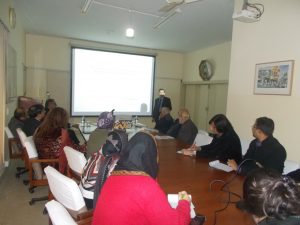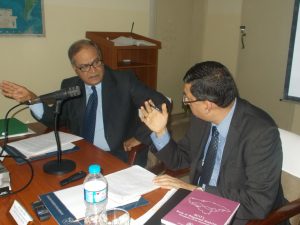National Confrence Talks 16/02/2015
- Guest Lecturer: Dr. Najam Abbas, Senior Fellow, South and Central Asia, East-West Institute, Belgium
- Date and venue: December 31, 2014, IPRI Conference Hall
Following were the salient features highlighted by the speaker:
- Various factors including friction-free, reassuring and rewarding relationship, influenced relations between China and the Central Asian States. China’s relationship with its neighbours had evolved both bilaterally and multi-laterally. The bilateral dimension of relations took precedence as each Central Asian state interfaced with China according to its own specific economic, socio-cultural and strategic perspective.

- In the Shanghai Cooperation Organization (SCO) region, China’s power was a reality. China is maintaining its influence in Central Asia through its “soft power”.
- For energy-thirsty China, securing energy supplies from neighbouring Kazakhstan, Turkmenistan and Uzbekistan remained a top priority of its ‘Resource Diplomacy’. It had lately also started making huge investments in the copper mines of Afghanistan.
- In addition to being the new platform for discussion, SCO could mediate differences and channel competition, particularly between Russia and China for mutually advantageous policies, which they both pursued to counter western influence. Due to that reason, Beijing preferred the continuation of Russian influence in Central Asia rather than allowing US domination in the region.
- For the Central Asian governments, SCO membership offered them a framework to shore up their own legitimacy internally and externally. The Central Asian leaders instead of pursuing a common stance were seen advancing their own exclusive interests. The differences in prospects for economic development, the levels of domestic fragility and the divergence in geopolitical strategies broadly influenced the perceptions of each state individually and their expectation from the SCO.
- Russia was reconfiguring regional relations for respect, relevance and revenues, which was reflecting its new vigour. Interesting dynamics were observed evolving at a time when Russia was undergoing through a test of its diplomatic and economic relations with European Union and its defence perspective towards NATO following its takeover/annexation of Crimea in 2014. Russia was showing urgency to counter the diplomatic and economic isolation by realigning relations and readjusting its priorities.
- Russia also intended to take coordinated steps in spheres such as economic, finance, energy and industrial safety. A consensus-based approach and joint response would be reflected in the SCO Development Vision till 2025, which would be prepared by the summit of SCO member states scheduled for July 2025 in Ufa, Russia. That vision would also envisage cooperation with multi-lateral institutions including United Nations (UN) and with its specialized agencies. There were also plans to establish ties with Eurasian Economic Community (EEC). As all this was pursued, at the same time, SCO would continue to pursue its top priority which remained to be regional stability, developing capabilities for a joint struggle against the three evils namely extremism, terrorism and separatism in the backdrop of the situation in Afghanistan.
- Russia’s partnership with China would serve as a strategic factor in tandem with economic rise of Russia. Moscow’s vision for Eurasian Union along with the silk route was twofold: grand geo-political projects to form a common economic territory and further industrialization to acquire huge strategic significance. Therefore extension of SCO was in the interest of Russia.
- SCO’s membership would be in Pakistan’s interest. It would enhance Pakistan’s stature in the diplomatic ranking in the region, if Pakistan played its cards well. Pakistan’s membership of SCO would not only provide an opportunity to Pakistan in influencing the regional security architecture to its benefit but it could also be able to acquire an important position in the SCO’s 2015-2025 vision.
- Since last sixty seven years, Pakistan had to endure a hostile relationship with India because of the unresolved issue of Kashmir. It had tried all the forums to resolve the Kashmir issue including United Nations Security Council (UNSC) and bilateral talks but all in vain. At some stage the SCO might be able to play a facilitating role in dealing with the Kashmir dispute.
- Pakistan should prepare itself well to avail the openings and opportunities offered by SCO because SCO had proven its effectiveness in dispute resolution and conflict prevention mechanism. Hence, it was needed to consider SCO as an
 alternative forum to help in resolving its disputes with India. If Islamabad remained reluctant to become a permanent member of SCO, whereas India became its regular member, Pakistan might lose in exploiting various opportunities which might arise in future.
alternative forum to help in resolving its disputes with India. If Islamabad remained reluctant to become a permanent member of SCO, whereas India became its regular member, Pakistan might lose in exploiting various opportunities which might arise in future. - Pakistan’s defence and security perspectives as well as objectives would be better served if it could become a permanent member of the SCO.

